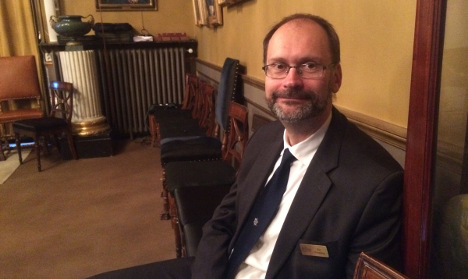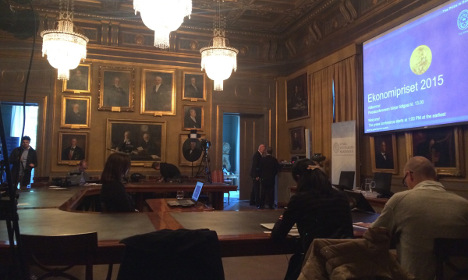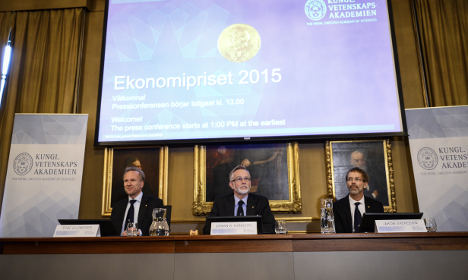- UK-born Angus Deaton awarded the Swedish Riksbank Prize in Economic Sciences 2015
Monday October 12th, Nobel Prize in Economics
14.40pm Until December!
For a final recap on Angus Deaton's work and why it matters, don't miss our guide to the economist and his research.
We're sure to hear much more about him between now and December, when he will travel to Stockholm to pick up his prize.
Click on the links below for a reminder of reports on who will be joining him to collect their Medicine, Physics and Chemistry and Literature awards in a couple of months time, and to find out more about the winners of the Nobel Peace Prize, which was announced in Oslo on Friday.
Right now though, we're wrapping up our final live blog on the 2015 Nobel announcements.
It's been a hectic eight days but we hope you have enjoyed our coverage!
14.34pm “Funny, witty and sometimes provocative”

Per Strömberg, a member of the Nobel committee. Photo: Emma Löfgren/The Local
Economists around the world are congratulating Angus Deaton on his win, with one Harvard professor even comparing the Briton to his favourite Star Wars character.
Angus Deaton is the Obi-Wan Kenobi of Economics. Breathtaking range of work in poverty, health, healthcare, wellbeing, methods…
— Amitabh Chandra (@amitabhchandra2) October 12, 2015
Delighted to hear that Angus Deaton, who taught me as a Masters student at U of Bristol wins Nobel prize in economics http://t.co/Rs9xP6F02j
— Jeanette Findlay (@JeanFind) October 12, 2015
13.39pm Interview time
Members of the Nobel committee are now giving media interviews about Angus Deaton and why he got the prize this year.
Meanwhile Twitter is filling up with comments from Britons, noting how similar the winner's name is to that of Angus Deayton, a former host of BBC comedy show Have I Got News For You, who was fired in 2002 following allegations about his private life.
So that's what he's been up to since HIGNFY: Angus Deaton wins Nobel economics prize for his analysis of consumption http://t.co/JJUkuz2kEu
— Daniel Bentley (@DJBentley) October 12, 2015
13.32pm Who is poor and why does it matter?
If you want to see Deaton explaining his work and ideas, here he is talking in 2014 about about how to decide who is poor.
A Menagerie of Lines: How to Decide Who is Poor? Lecture by Deaton from 2014: https://t.co/yD66KB7wdt #NobelPrize
— The Nobel Prize (@NobelPrize) October 12, 2015
13.28pm Academic background
Angus Deaton has just thanked the committee and wrapped up his phone conversation with journalists.
Here are a few more key facts about him:
– The professor is a UK and US citizen, who was born in 1945 in Edinburgh, UK.
– He obtained his Ph.D. in 1974 from the University of Cambridge, UK.
– He is currently Professor of Economics and International Affairs at Princeton University in the US, where he has been working since 1983.
13.25pm “Pretty sleepy”
Professor Deaton has been asked about how he felt when he was first told he had won the prize.
“I was pretty sleepy (…) I was just delighted,” he has told journalists.
He's admitted he knew it was a possibility that his work could be recognized by the committee but was still shocked to get told he had won the prize.
13.22pm Why him?
“I am absolutely delighted,” the economist has told media in Stockholm. He's described himself as “someone who is concerned with the poor of the world” and said he's very pleased that his particular field has been recognized in 2015.
Angus Deaton says he's “absolutely delighted” to win the #NobelPrize pic.twitter.com/m9zuBGazio
— Emma Lofgren (@ekjlofgren) October 12, 2015
13.19pm The future?
Deaton is telling journalists that there has been progress in tackling inequality in many countries but added “we are not out of the woods yet” in many parts of the world. He has a soft Scottish accent, with an American tinge, following years of research in the US.
13.18pm In his own words
13.15pm The winner is on the phone
There have been a few technical problems at the Royal Swedish Academy of Sciences but the winner Angus Deaton is now on the phone.
He's been asked about how he's looked at gender inequality as part of his research. But he has said he feels that others have looked more closely at this issue than him. On the refugee crisis, he's said it is the result of many years of global inequality.
Swedish journos asking about #refugeecrisis, which is the result of hundreds of years of unequal development, says Angus Deaton #NobelPrize
— Emma Lofgren (@ekjlofgren) October 12, 2015
13.12pm Studying poverty
“To design economic policy that promotes welfare and reduces poverty, we must first understand individual consumption choices. More than anyone else, Angus Deaton has enhanced this understanding,” the Nobel Assembly has written in its press release announcing Angus Deaton's win.
The work for which Deaton is now being honoured revolves around three central questions:
– How do consumers distribute their spending among different goods?
– How much of society's income is spent and how much is saved?
– How do we best measure and analyze welfare and poverty?
Nobel committee says consumption is important partly because it helps us understand welfare and income #nobelprize #economics
— Emma Lofgren (@ekjlofgren) October 12, 2015
13.08pm So who is Angus Deaton?
13.02pm The winner is…
Scotland-born Angus Deaton for his work on “consumption great and small”.
The Nobel Academy has praised him for his analysis of consumption, poverty, and welfare”.
12.55pm Stand by…
So has there been too much hype surrounding the likelihood that Blundell will get the prize? Will this lead to a great depression for the Brit? Is the interest (rate) in this blog falling as a result of our speculation and bad jokes? Or are we about to get so many clicks we crash the internet?
Whatever, we're poised for the final Nobel Prize announcement of 2015. The wait is almost over.
The #NobelPrize committee likes surprise. Would picking a frontrunner as #economics winner be too, er, low hanging fruit?
— Emma Lofgren (@ekjlofgren) October 12, 2015
12.45pm How the winners are chosen
Dreaming of winning a Nobel someday? Even if you're lucky enough to get nominated, its a very long process to get even a sniff of the prize.
The process to select the Laureates in Economic Sciences: pic.twitter.com/P3zmkyPizt
— The Nobel Prize (@NobelPrize) October 12, 2015
12.35pm Final bets?
Fancy doing a last-minute office sweepstake on the potential winner(s)?
British economist Sir Richard William Blundell is one of the top names being talked about ahead of the announcement. And although speculation ahead of the Nobels often turns out to be wrong, the Literature prize this year did go to the favourite.
Blundell, 63, is a professor of political economy at University College London and research director at the Institute for Fiscal Studies. He's the top name on Thomson Reuters' list of favourites to claim the prestigious award. His research areas include tax credits, work incentives, and the effects of wages on household consumption.
Who’s going to win the 2015 Nobel Prize in economics? http://t.co/d7MifyA1Qo
— Real Time Economics (@WSJecon) October 12, 2015
Other influential thinkers included in speculation ahead of the announcement are John A List of the University of Chicago for creating field experiments to test economic theories and Charles Manski of Northwestern University for his research in social policy analysis and rational choice theory.
Gossip among journos is that they're hoping for a #NobelPrize winner with broad appeal and research background in eg consumer markets
— Emma Lofgren (@ekjlofgren) October 12, 2015
One of the #NobelPrize favourites is British economist Sir Richard Blundell. But now that I've mentioned him he's probably not going to win.
— Emma Lofgren (@ekjlofgren) October 12, 2015
12.30pm Watch the announcement online
We'll be live blogging all the key moments from the announcement right here, but if you'd prefer to watch the Nobel Academy reveal their chosen winner, check out the video stream below.
12.16pm Nobel fatigue?
The Local's Emma Löfgren has arrived at the Royal Swedish Academy of Sciences where the economics prize winner will be announced within 45 minutes. But the room appears to be less packed than last week, when journalists jostled for a spot ahead of the chemistry and physics prize declarations.

Photo: Emma Löfgren/The Local
The Royal Swedish Academy of Sciences, the invisible hand behind the #NobelPrize in #economics @vetenskapsakad pic.twitter.com/vKPvvOT1g5
— Emma Lofgren (@ekjlofgren) October 12, 2015
12.00pm Watch out for hoax callers!
As always, the Nobel Committee (or Academy, as it is also often described) will attempt to phone the person or people awarded the prize to get their reaction and allow them to answer questions from journalists.
But beware of fake Swedish accents if you're a top economist waiting for your screen to light up in the next hour.
Economics Nobel will be announced in an hour. Time to use my fake Swedish accent to prank call old self-important economists.
— Justin Wolfers (@JustinWolfers) October 12, 2015
11.55am Sweden's star of the week
Here in Sweden, this year's homegrown winner of the Nobel Prize in Chemistry is still grabbing plenty of headlines. Tomas Lindahl used to work at the Karolinska Institute in Stockholm and the award-winning academic research centre has just released an interview with its new star.
As The Local revealed on Wednesday, his main passion away from science is wine, and he told Karolinska's news team on Monday that he had “cracked open a good vintage last night. I love wine, so it was a good excuse!”
“You’ve got to find your own line of research to follow“. Interview with #Nobel Laureate Tomas Lindahl http://t.co/ROJ18I4Qdh #NobelPrize
— KarolinskaInstitutet (@karolinskainst) October 12, 2015
11.39am A popularity contest
So, how many other Nobel economics laureates can you name? The people manning the Nobel Prize twitter account have just released a list of the 'most popular' winners in history. We're guessing this is more to do with their work and how well known they are, rather than whether or not they scored a date for their school prom or have a reputation for buying huge rounds at the pub.
TOP 10 most popular Laureates in Economic Sciences at http://t.co/B0vLAKQGhM right now: pic.twitter.com/HLEaJgz2zd
— The Nobel Prize (@NobelPrize) October 12, 2015
11.27am Facts and figures
Before we even start talking economics, here are the key statistics you need to know about today's economics prize.
– It has been awarded 46 times to 75 Laureates between 1969 and 2014.
– Last year it was picked up by Frenchman Jean Tirole “for his analysis of market power and regulation” in industry.
– It took until 2009 for a woman to be given the accolade, when American Elinor Ostrom was recognized by the Nobel Academy.
Finally, in 2009, the 1ST woman was awarded the Prize in Economic Sciences – Elinor Ostrom! pic.twitter.com/wKrSRmzE5l
— The Nobel Prize (@NobelPrize) October 12, 2015
11.15am Not a 'real' Nobel Prize
Formally known as the Swedish Riksbank Prize in Economic Sciences in Memory of Alfred Nobel 2015, the economics prize is one of the more modern awards. It was not part of Nobel's original will and was only created in 1968, sponsored by Sweden's Central Bank (the Riksbank).
But that doesn't make it any less prestigious. British and US economists are among the front runners to win it this autumn and there's plenty of media buzz ahead of the announcement.
It's Economics Nobel Prize Day. Just a reminder not to be That Guy… pic.twitter.com/6viFOerzFi
— Five Minute Macro (@5_min_macro) October 12, 2015
11.03am The last Nobel Prize of 2015
It's the final day of Sweden's Nobel Prize announcement season. Get your brains in gear for the Economics announcement, which we'll do our best to explain as simply as we can.
If you haven't been following The Local's Nobels coverage so far (and why not?), check out our reports on who won the awards in Medicine, Physics and Chemistry and Literature last week, as well as the Nobel Peace Prize, which was announced in Oslo on Friday.
The Local's Deputy Editor Emma Löfgren is heading to the Economic Prize announcement at the Royal Swedish Academy of Sciences, while our Editor Maddy Savage is manning this live blog.
On my way to #NobelPrize in #economics announcement. Winter coat on. Talk about seasonal adjustment. #economicsjokes pic.twitter.com/1odPNBOZ8t
— Emma Lofgren (@ekjlofgren) October 12, 2015


 Please whitelist us to continue reading.
Please whitelist us to continue reading.